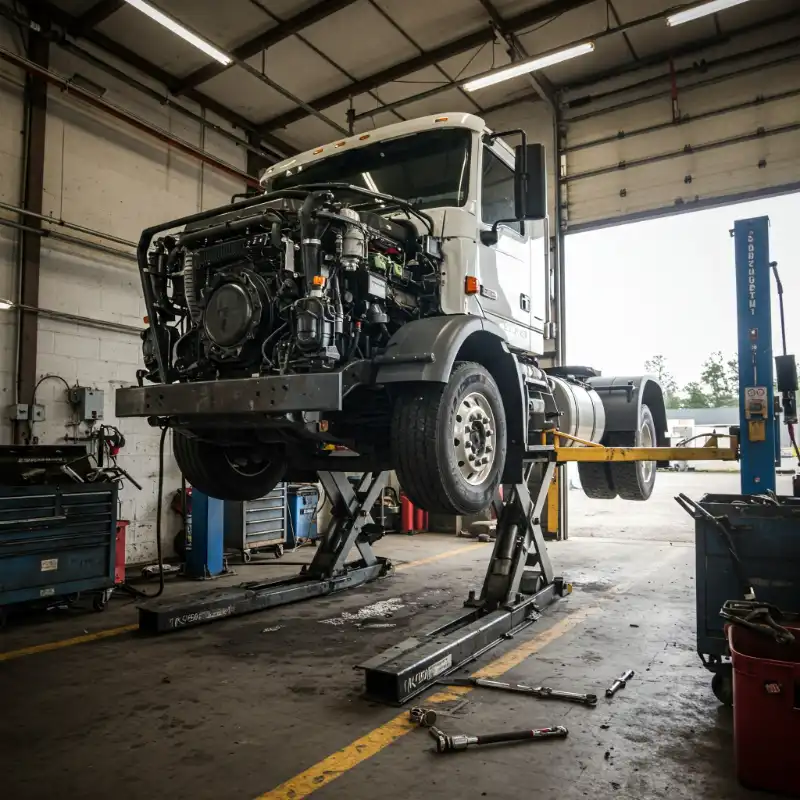For diesel engines, especially in heavy-duty trucks, after-treatment systems are crucial in reducing emissions to meet environmental regulations. At OTR Fleet Service, we've seen firsthand how complex and essential these systems are. From the Exhaust Gas Recirculation (EGR) system to the Diesel Particulate Filter (DPF), understanding how to diagnose and repair these components can save time, money, and ensure compliance with emissions standards.
Common After-Treatment Systems and Their Functions
Before diving into troubleshooting tips, let's briefly revisit the key components of the after-treatment system:
- Exhaust Gas Recirculation (EGR) System: Reduces nitrogen oxide (NOx) emissions by recirculating a portion of the exhaust gases back into the engine cylinders, lowering combustion temperatures.
- Diesel Particulate Filter (DPF): Captures soot and other particulates from the exhaust. It needs periodic regeneration to burn off the accumulated soot.
- Selective Catalytic Reduction (SCR) System: Reduces NOx emissions by injecting Diesel Exhaust Fluid (DEF) into the exhaust stream, converting NOx into nitrogen and water.
- Diesel Oxidation Catalyst (DOC): Converts carbon monoxide and hydrocarbons in the exhaust into carbon dioxide and water.
Diesel Particulate Filter (DPF)
One of the most common issues is a clogged Diesel Particulate Filter (DPF). Signs that your DPF may need regeneration include reduced engine power, increased fuel consumption, and warning lights on the dashboard. The DPF traps soot, which must be periodically burned off during a process known as regeneration. When regeneration fails—often due to faulty sensors or insufficient driving conditions—the DPF can become clogged, leading to more severe engine problems.
To address this issue, ensure the truck is driven at highway speeds periodically to allow for active regeneration. If the problem persists, you may need to perform a forced regeneration using diagnostic tools.
Selective Catalytic Reduction (SCR) and Diesel Exhaust Fluid (DEF)
The Selective Catalytic Reduction (SCR) system relies on Diesel Exhaust Fluid (DEF) to reduce NOx emissions. If your system is not reducing NOx as expected, the issue may lie within the DEF system or the SCR catalyst itself. Here are some troubleshooting steps:
- Check DEF Quality: Ensure that the DEF meets ISO 22241 standards. Contaminated or poor-quality DEF can crystallize in the system, blocking injectors and reducing efficiency.
- Inspect the DEF Injector: The injector sprays DEF into the exhaust stream. If it's clogged or malfunctioning, NOx reduction will be compromised.
- Examine the SCR Catalyst: Over time, the catalyst can become clogged or coated with soot and other contaminants, reducing its effectiveness. In such cases, it may need cleaning or replacement.
Exhaust Gas Recirculation (EGR)
The Exhaust Gas Recirculation (EGR) system is critical for controlling NOx emissions. However, it's also prone to issues such as valve clogging or cooler failures. Symptoms of EGR problems include rough idling, reduced fuel efficiency, increased exhaust smoke, and engine knocking.
To diagnose EGR issues:
- Check the EGR Valve: The valve can become clogged with soot, causing it to stick. This can often be cleaned, but in severe cases, replacement might be necessary.
- Inspect the EGR Cooler: A leaking EGR cooler can cause coolant loss, leading to overheating and engine damage. If the cooler is leaking or clogged, it will need to be replaced.
- Look for Sensor Faults: The EGR system relies on various sensors to function correctly. A faulty sensor can lead to incorrect readings, resulting in poor EGR performance. A thorough diagnostic check can identify faulty sensors.
How Can I Prevent After-Treatment System Failures?
Preventive maintenance is key to avoiding costly repairs and ensuring your after-treatment systems function correctly. Here are some best practices:
- Regularly Inspect and Clean Components: Regular inspections can identify potential issues before they lead to system failures. Cleaning components like the EGR valve and cooler can prevent soot buildup.
- Monitor DEF Levels and Quality: Always ensure your DEF tank is filled with high-quality fluid and avoid letting the tank run dry, which can damage the SCR system.
- Perform Scheduled Regenerations: Don't ignore regeneration alerts. Regular regeneration cycles are crucial for maintaining DPF efficiency. Forced regenerations should be performed if automatic regenerations fail.
- Use OEM-Approved Parts and Fluids: Always use parts and fluids that meet OEM specifications to ensure compatibility and performance.
How Do I Troubleshoot After-Treatment System Fault Codes?
Modern heavy-duty trucks are equipped with onboard diagnostics (OBD) systems that will alert you to after-treatment issues via fault codes. Common fault codes include:
- P2002: DPF efficiency below threshold. Indicates that the DPF may be clogged or not regenerating properly.
- P207F: Reductant quality performance. Suggests issues with DEF quality or SCR efficiency.
- P0401: EGR flow insufficient. Indicates a potential clog or malfunction in the EGR valve or cooler.
When a fault code appears, it's important to not only address the code but to understand the root cause. At OTR Fleet Service, we use advanced diagnostic tools to read and interpret fault codes, allowing us to quickly identify and repair the issue.
Final Thoughts
After-treatment systems are complex but essential for reducing emissions and maintaining compliance with environmental regulations. By understanding how these systems work and performing regular maintenance, you can avoid costly repairs. At OTR Fleet Service, with locations in San Antonio, Austin, Dallas, and Houston, we're here to help with all your after-treatment system needs. Whether it's diagnosing a stubborn fault code, performing a forced regeneration, or replacing a faulty EGR valve, our team of experts is ready to get your truck back on the road.










.webp)





























